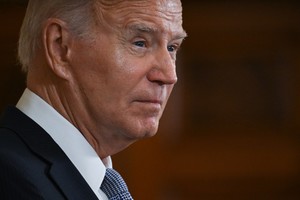When (or if) a Former President Gets Indicted

When Facebook reinstated Donald Trump to its platform earlier this month, the message posted by the former president was direct and to the point.
“I’M BACK!” Trump wrote in the post, which also included a short video from the night of his election back in 2016. “Sorry to keep you waiting. Complicated business. Complicated.”
Yes, he is back. And yes, it has been very complicated business. Complicated.
Just a few months ago, it appeared as if Trump’s extraordinary political career might be heading into its final chapter. After a desultory announcement event in November and several weeks of uncharacteristically low-profile and sporadic campaign activity, many Republicans seemed to be ready to move on to another standard-bearer for their party. The primary beneficiary of this restlessness was Florida Governor Ron DeSantis, whose decisions to keep his state open during the pandemic, his landslide re-election last fall and his penchant for embracing conservative ideology on education policy and other social and cultural issues have made him a hero to many party regulars.
But in recent weeks, DeSantis’ early advantages in public opinion polling have evaporated and Trump has re-established himself as a solid (albeit early) favorite for the nomination. Some of this shift has been a result of Trump’s scorched-earth attacks on DeSantis’ political and personal history and some because of the Florida governor’s unsteady performance as he has ventured beyond his home state. But one of the biggest factors in Trump’s turnaround are the former president’s legal troubles, which have rallied a large portion of the Republican party base back to his side.
Trump’s lawyers have been busy in courtrooms up and down the Eastern seaboard, defending him against a range of charges, including allegations of interfering with vote-counting, potential involvement in the January 6 Capitol uprising and disputes over a large number of documents with national security ramifications. But the biggest at the moment is the Manhattan District Attorney Alvin Bragg’s case against Trump relating to alleged hush money payments made on Trump’s behalf to porn star Stormy Daniels during the 2016 campaign.
There is a discussion to be had at some point about the inconsistencies -- if not downright hypocrisy -- on both sides of the aisle regarding presidents’ personal conduct. The Democrats who defended Bill Clinton against impeachment charges are the most outraged by Trump’s behavior and the Republicans who led the charge against Clinton are the most stalwart in defending Trump. It’s also debatable whether this is the most relevant of the charges against Trump to proceed to an indictment (which may be issued this week.)
But regardless, Trump has found a way to weaponize the potential of his own looming arrest as both a motivator for his core supporters and a cudgel against DeSantis. It’s been reported that Trump actually relished the prospect of a so-called “perp walk” if he was taken into custody for the galvanizing effect it would have on his most loyal fans. And he has taken to social media with overt calls for violence should the indictment be issued.
When Trump rallied his supporters to come to Washington in the days leading up to January 6, he used language like “wild” and “fight” to stoke their fires. His critics argued that his word choice was intentionally inciting violence: his defenders claimed that the language was meant in a political context and was not meant to be taken literally.
No such ambiguity exists now. When Trump supporters made the case that Trump’s call for mass protests were intended to be non-violent, Trump posted on social media: “Our country is being destroyed, as they tell us to be peaceful.” In case that was not clear, he followed up by warning of “death and destruction” if charges were brought against him.
This type of behavior will be extremely damaging in a general election campaign, when Trump would need to find a way to win back those swing voters who abandoned him in 2020. But it appears that his defiant response to the legal challenges he faces have strengthened his support among GOP primary voters and put him in an enhanced position as the pace of the pre-primary campaign quickens.
DeSantis is still said to be several months away from an official announcement of candidacy. But questions are beginning to arise about whether he possesses the combative streak that many Republicans found so attractive in Trump. Conservative populists still want a fighter who will take on the political establishment. If they are going to leave Trump, it’s going to require someone who is just as pugnacious.
Dan Schnur is a Professor at the University of California – Berkeley, Pepperdine University, and the University of Southern California, where he teaches courses in politics, communications and leadership. Dan is a No Party Preference voter, but previously worked on four presidential and three gubernatorial campaigns, serving as the national Director of Communications for the 2000 presidential campaign of U.S. Senator John McCain and the chief media spokesman for California Governor Pete Wilson. He has a Center bias.
This piece was reviewed and edited by Managing Editor Henry A. Brechter (Center bias).
Read more of Dan’s writing at: www.danschnurpolitics.com.

May 13th, 2024

May 9th, 2024


May 7th, 2024